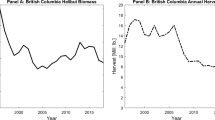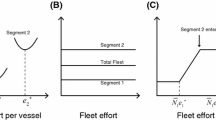Abstract
Linear programming is applied to assess the optimal capacity of the Norwegian industrial fishing fleet when quotas are random. A great potential for profit is identified and the significance of resource uncertainty for practical management is de-emphasized.
Similar content being viewed by others
References
S. D. Flåm and S. Storøy, Capacity reduction of Norwegian industrial fisheries, Can. J. Fisheries and Aquatic Sciences 39, No. 9 (1982) 1314.
S. D. Flåm and S. W. Wallace, Capacity adaption of a fishing fleet facing uncertain quotas, Tech. Rep. 822550-5 (The Chr. Michelsen Institute, Bergen, 1982).
S. D. Flåm, Steady states in population models with monotone, stochastic dynamics, J. of Math. Biol. 13 (1981) 87.
A. Prékopa, Laws of large numbers for random linear programs, Math. Syst. Theory 6, no. 3 (1972) 277.
D. Walkup and R. Wets, Stochastic programs with recourse: special forms, Proc-Princeton Symp. on Math. Progr., ed. H. Kuhn (Princeton University Press, Princeton, 1970) p. 139.
Author information
Authors and Affiliations
Rights and permissions
About this article
Cite this article
Flåm, S.D. Optimal capacity in fisheries; A case where randomness is of minor importance. Ann Oper Res 1, 79–83 (1984). https://doi.org/10.1007/BF01874454
Issue Date:
DOI: https://doi.org/10.1007/BF01874454




